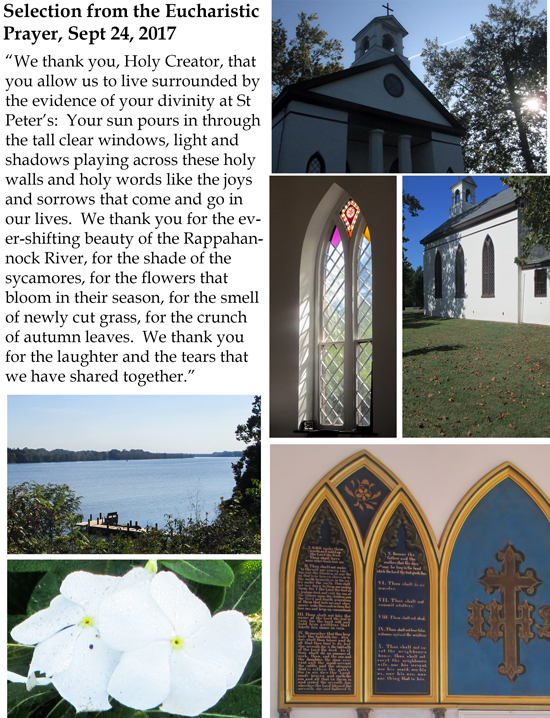
Season of Creation
Climate Change – and you – the big items
- A house with a furnace is like a car that idles all day. Swap your furnace for a heat pump, which works by extracting heat from one location and transferring it to another (Tax Credit : 30% of the cost paid by the consumer, up to $2,000/year,)
- Swap your gas stove for an electric stove, which will also lower indoor air pollution (rebate amount has not been publicized year)
- Install a programmable thermostat model to turn off the heat/air conditioning when you’re not home.
- Get a home or workplace energy audit to identify where you can make the most energy-saving gains. ( Tax credit – 30% of the cost paid by the consumer, up to $150)
- Consider Solar- This is a significant expense but can vary depending on the company you choose.
30% federal tax credit via Inflation reduction act. State – – A property tax exemption for the increase in home value after going solar.
Solar Renewable Energy Certificates (SRECS), which are financial incentives for generating clean electricity. You gain one SREC for every 1,000 kilowatt-hours generated by your solar panels, and you can sell the credits to local electricity providers and other organizations that are subject to renewable energy mandates. As of 2023, each SREC can be sold for around $45 to $70.
Solar alternative – Even if you can’t install solar panels, you can still be a part of the clean-energy economy. Check out – Old Dominion Electric Cooperative (ODEC) odec.com. ODEC has entered several long-term purchase power agreements for energy generated by wind, solar, and landfill gas resources. .
Your home – other
- Unplug computers, TVs and other electronics when you’re not using them
- Turn off lights you’re not using and when you leave the room. Change to energy-efficient LED bulbs
- Wash clothes in cold water. Hang-dry your clothes when you can
- Draft proof.
Drafts waste five to 30 per cent of energy. Those from basements and roofs cool the most. Seal doors, windows and chimneys in those areas first. Try testing with incense. Where the smoke wavers, a draft is blowing in.To seal leaks, make or buy a “door snake” and caulk and weatherstrip doors and windows. Look for non-toxic, eco-friendly caulks. You can also add small insulating covers underneath electric outlet wall plates on outside walls or beside cold basements and crawl spaces. - Insulate windows.
Hang heavy curtains to keep the cold out and the cozy in. A cheaper solution: insulation film, available at most hardware stores. This plastic shrink film is easy to apply and keeps in much of the heat that would otherwise escape. - Reverse ceiling fans.
Many ceiling fans have a reverse mode. When they turn clockwise, they push down warm air that pools near the ceiling and circulates it through the room. - Change furnace filters.
Dirty filters restrict airflow and increase your furnace’s energy demand by making it work harder. Replace filters at least every three months during the heating season.Better indoor air quality is a nice side benefit of this energy-saving tip. Consider switching to a washable filter, which reduces waste and is more effective. - Check your thermostat.
Every degree you turn it down can save between 1.5 and five per cent of your heating bill. A programmable thermostat will help you get efficient and consistent.Turn down the thermostat when you’re sleeping or out. It’s is the most efficient way to reduce your heating bill — and your eco-footprint.
Transportation
Carpooling
- Combine errands to make fewer trips. Remove excess weight from your car. Use cruise control.
Consider electric or hybrid or low carbon vehicle for your next car
Speeding and unnecessary acceleration reduce mileage by up to 33%, waste gas and money, and increase your carbon footprint.
- Properly inflated tires improve your gas mileage by up to 3%. It also helps to use the correct grade of motor oil, and to keep your engine tuned
Fly less and take alternate transportation
Season of Creation – Food waste
1. Food Waste
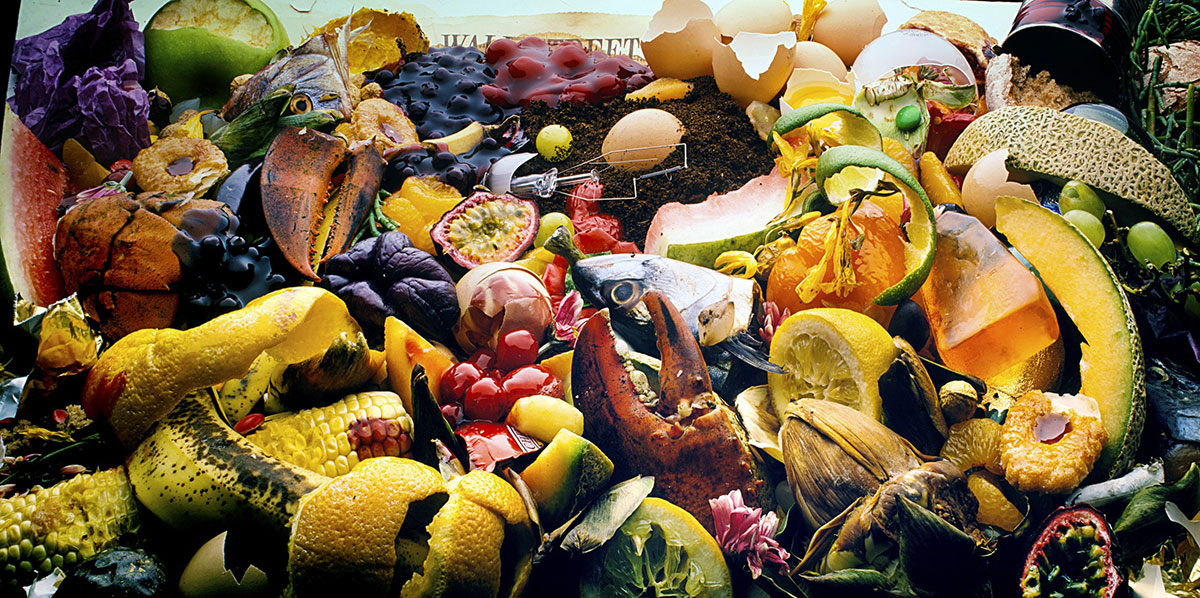
The local food banks and other distributors have worked out agreements with restaurants to help eliminate waste by taking foods they cannot sell due to sell by dates and redistributing the foods. Globally, the issue of waste is a large one.
World Wildlife Federation has covered the topic in its fall magazine.
“Today, 7.3 billion people consume 1.6 times what the earth’s natural resources can supply. By 2050, the world’s population will reach 9 billion and the demand for food will double.
“So how do we produce more food for more people without expanding the land and water already in use? We can’t double the amount of food. Fortunately we don’t have to—we have to double the amount of food available instead. In short, we must freeze the footprint of food.
“In the near-term, food production is sufficient to provide for all, but it doesn’t reach everyone who needs it. In fact, one-third of the world’s food—1.3 billion tons—is lost or wasted at a cost of $750 billion annually. When we throw away food, we waste the wealth of resources and labor that was used to get it to our plates. In effect, lost and wasted food is behind more than a quarter of all deforestation and nearly a quarter of global water consumption. It generates as much as 10% of all greenhouse-gas emissions. As it rots, it pollutes water and soil and releases huge amounts of methane, one of the most potent greenhouse gases.
“Another negative aspect of food waste is its connection to species loss. Consider this: Food production is the primary threat to biodiversity worldwide, expected to drive an astonishing 70% of projected terrestrial biodiversity loss by 2050. That loss is happening in the Amazon, where rain forests are still being cleared to create new pasture for cattle grazing, as well as in sub-Saharan Africa, where agriculture is expanding rapidly. But it’s also happening close to home.
“These wasted calories are enough to feed three billion people—10 times the population of the United States, more than twice that of China, and more than three times the total number of malnourished globally. Wasted food may represent as much as 10% of global greenhouse gas emissions, and is a main contributor to deforestation and the depletion of global water sources.
“By improving efficiency and productivity while reducing waste and shifting consumption patterns, we can produce enough food for everyone by 2050 on roughly the same amount of land we use now. Feeding all sustainably and protecting our natural resources.”
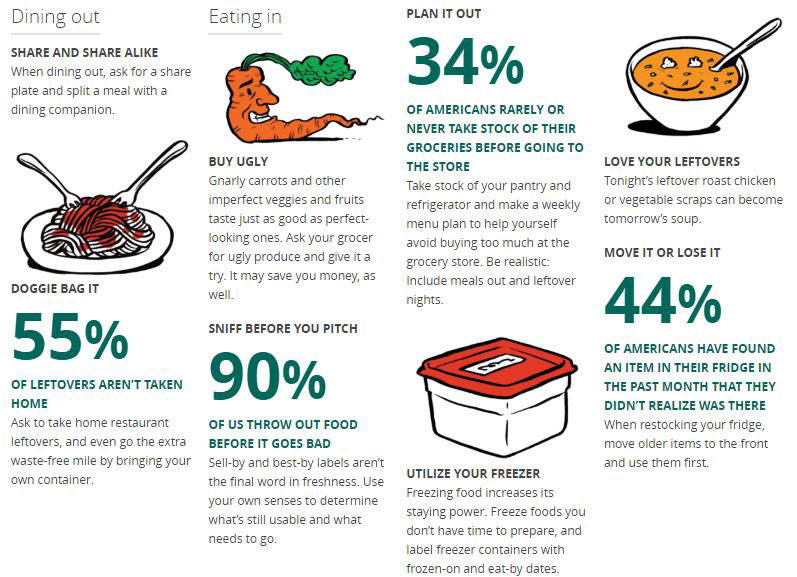
South Korea has a system that keeps about 90 percent of discarded food out of landfills and incinerators, has been studied by governments around the world. But the country’s mountainous terrain limits how many landfills can be built, and how far from residential areas they can be built.
Since 2005, it’s been illegal to send food waste to landfills. Local governments have built hundreds of facilities for processing it. Consumers, restaurant owners, truck drivers and others are part of the network that gets it collected and turned into something useful.
In the case of a restaurant when it gets to a plant. Debris — bones, seeds, shells — is picked out by hand though most facilities are automated. A conveyor belt carries the waste into a grinder, which reduces it to small pieces. Anything that isn’t easily shredded, like plastic bags, is filtered out and incinerated.
Then the waste is baked and dehydrated. The moisture goes into pipes leading to a water treatment plant, where some of it is used to produce biogas. The rest is purified and discharged into a nearby stream.
What’s left of the waste at the processing plant, four hours after Mr. Park’s team dropped it off, is ground into the final product: a dry, brown powder that smells like dirt. It’s a feed supplement for chickens and ducks, rich in protein and fiber, said Sim Yoon-sik, the facility’s manager, and given away to any farm that wants it.
For consumers, at apartment complexes around the country, residents are issued cards to scan every time they drop food waste into a designated bin. The bin weighs what they’ve dropped in; at the end of the month they get a bill.
Climate Change, More Book, Part 3 Reduce, Sept. 24
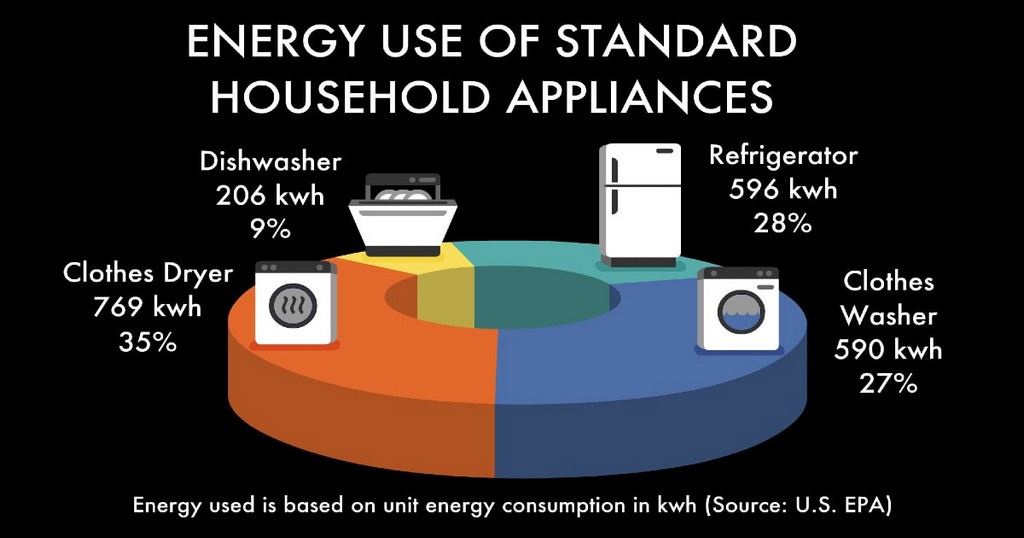
The first two chapters of the MORE book were required material to get to Part 3 – Reduce.
Understanding the significance of our need to reduce greenhouse gases from Part 1, led to calculate our carbon footprint in Part 2. We meet to strive towards net zero emissions by 2050. Net zero means cutting greenhouse gas emissions to as close to zero as possible, with any remaining emissions re-absorbed from the atmosphere, by oceans and forests for instance. Part 2 focuses on reduction to get to net zero.
How much do we need to reduce our carbon footprints? For Americans, that number is about 90 percent.The United Nations’ intergovernmental Panel on Climate Change (IPCC) has said that if we don’t act now, we’ll be facing the severe effects of a warming planet as early as 2040. One example? 50 million people around the world, will be affected by coastal flooding.
This chapter lists 26+ ways for us to act.
Click this button  on the bottom right of the PowerPoint window to enlarge
on the bottom right of the PowerPoint window to enlarge
Season of Creation Podcast for Sept 24

The Prophetic Voices podcast of the Episcopal church has a series of episodes focused on the Season of Creation. The podcast is hosted by the Rev. Shaneequa Brokenleg, who is the Episcopal Church’s staff officer for Racial Reconciliation. The podcast explores the lectionary through the lens of social justice.
All episodes.
Here is this week’s Sept 24 podcast
Sermon, Proper 19, Season of Creation 3
Psalm 103; Romans 14:1-12, Matthew 18:21-35

Practicing forgiveness is part of the art of living fully, joyfully, and peacefully in this world. Last week, Tom provided us with that unforgettable image of a person standing in the ocean trying to hold a beach ball under the water—and how that effort meant that the person was not free to do anything else. Not forgiving, he pointed out, is like trying to hold that beach ball under the water.
In today’s gospel, Jesus tells a story about a king who forgave a slave in tremendous debt to the king. That slave, having been forgiven his debt, went out and refused to forgive one of his fellows who owed him money. In fact, the forgiven slave had the person in debt to him thrown into jail until the man could pay his debt to the slave the king had so generously forgiven.
The others who witnessed all of this went and told the king, who called the forgiven slave in. The king said, “You wicked slave! I forgave you all that debt because you pleaded with me. Should you not have had mercy on your fellow slave, as I had mercy on you?”
And the king hands over the slave to be tortured until he pays his original debt.
And then comes this zinger from Jesus.
“So my heavenly Father will also do to every one of you, if you do not forgive your brother or sister from your heart.”
That is, we suffer the consequences when we continue to be unforgiving people.
So I’m wondering—are there, in the end, limits to God’s limitless mercy?
Bulletin, Pentecost 16, Sept. 17, 2023
Click here to view in a new window.
Season of Creation – Energy
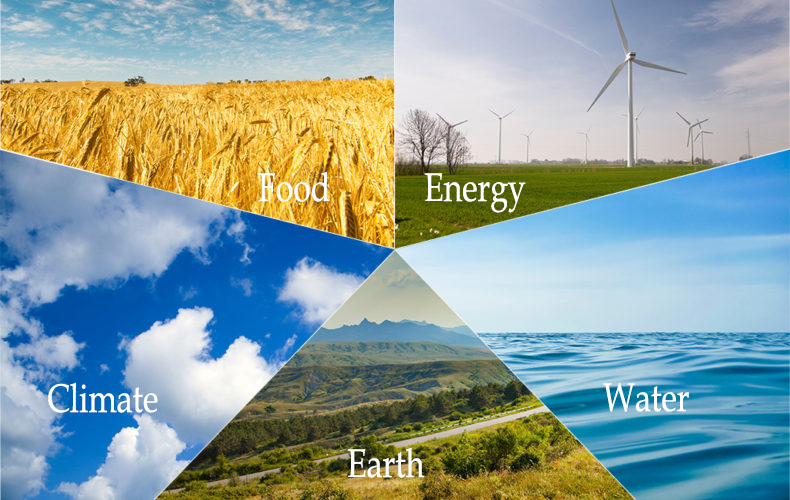
We have taken the five Sundays readings in the Season of Creation and highlighted a specific environmental area which we will cover weekly. (This week, energy ) How is this area affecting us ? What can we do at St. Peter’s and individually to improve our use of them ? We have added related scriptures.
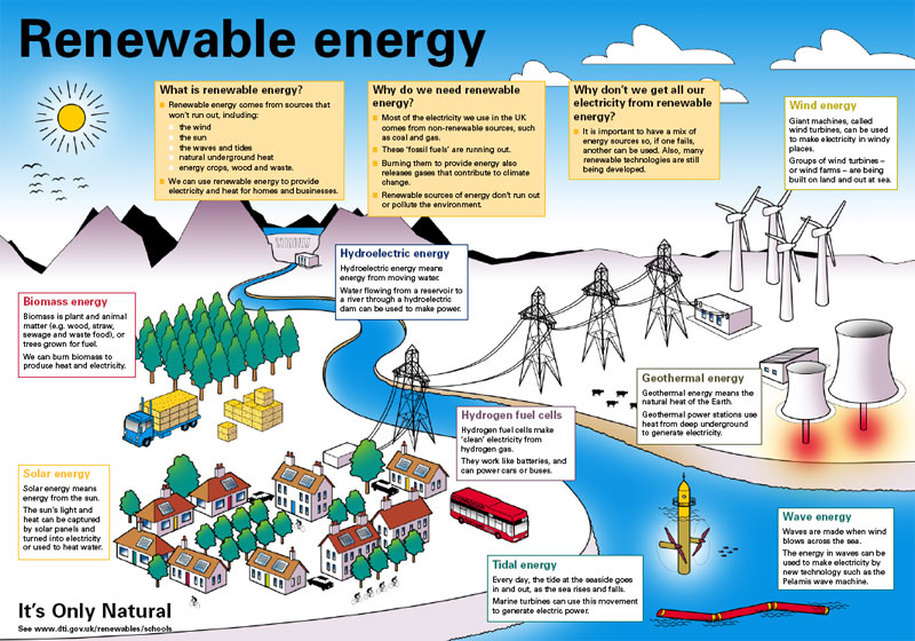
![]()
Isaiah 40:28-31 “The LORD is the everlasting God, the Creator of the ends of the earth. He does not faint or grow weary; his understanding is unsearchable. 29 He gives power to the faint, and strengthens the powerless. 30 Even youths will faint and be weary, and the young will fall exhausted; 31 but those who wait for the LORD shall renew their strength, they shall mount up with wings like eagles, they shall run and not be weary, they shall walk and not faint.”
1. Power in the Bible
We think of power in the natural world as produced from various energy sources in nature -the sun, wind, coal, water, geothermal, oil, biomass and the atom (nuclear). Power in religious terms is spiritual energy God is unlimited and this spiritual energy is unlimited in contrast to the energy we seek in the physical world which is limited. The difference from the physical world is that we do not consume this spiritual energy; we reflect it. It can be adapted to many needs in this world.
A. Power is an inherent characteristic of God ( Rom 1:20 ). It is the result of his nature. God’s kind of power is seen in his creation ( Psalm 19 ; 150:1 ; Jer 10:12 ). His inexplicable power is the only explanation for the virgin birth of Jesus ( Luke 1:35 ). Power is always a derived characteristic for people, who receive power from God ( Deut 8:18 ;Isa 40:29 ; Micah 3:8 ; Matt 22:29 ; 1 Cor 2:4 ; Eph 3:7 ), from political position ( Esther 1:3 ; Luke 20:20 ), from armies ( 1 Chron 20:1 ), and from other structures that provide advantage over others. When humans perceive that their power is intrinsic to themselves, they are self-deceived ( Lev 26:19 ; Deut 8:17-18 ; Hosea 2:7-9 ; John 19:10-11
B. The Bible uses spiritual energy which is transmitted to humans. It begins with God’s generation of light. This illumination is the spontaneous effect of divine Love in action, of Truth manifested. The Bible then goes on to chronicle this energizing force in the lives of individuals and nations, such as Moses energizing his people, leading them out of slavery and introducing them to the laws of God and brought them to the borders of the Promised Land.
Later Jesus said, “I am come a light into the world, that whosoever believeth on me should not abide in darkness.” n2 His great power to do good was generated by God.When he took Peter and John up onto the mount and was transfigured before them, “His face did shine as the sun, and his raiment was white as the light.” n3 The sparkling spiritual energy the disciples saw in him was evident throughout his ministry, feeding thousands and calming seas. He told his disciples that they could move mountains if they had “faith as a grain of mustard seed
C Faith in God is a transformer. It transforms thinking. Holding to it and living by it can bring a solution to energy needs by causing us to be more inventive, more aware of resources close at hand, more accurate and disciplined, more universal in our concerns, and thus more equitable.
Paul especially images the living of the Christian life as an empowerment from God. The believer’s union with Christ delivers him or her from the power of sin (cf. Rom. 6-8) and introduces him or her to the “power of [Christ’s] resurrection” ( Php 3:10 ). Salvation and holy living provide the Christian with a “spirit of power” for witness ( 2 Tim 1:7-8 ).
D. For our use we may find spiritual energy can be generated through prayer.
Project Drawdown – a Plan to achieve drawdown
Climate drawdown refers to the future point in time when levels of greenhouse gas concentrations in the atmosphere stop climbing and starts to decline. Drawdown is a milestone in reversing climate change and eventually reducing global average temperatures.
Project Drawdown refers to the nonprofit organization with the mission to help the world reach drawdown and stop catastrophic climate change quickly, safely, and equitably. In 2017, a publication titled “Drawdown” became a New York Times bestseller, where it highlighted and described different solutions and efforts available to help reach this goal.
Project Drawdown is a climate change mitigation project initiated by Paul Hawken and climate activist Amanda Joy Ravenhill.
The main principles of the project are to:
What are the sources of emissions to be reduced?
These are the sources of emissions along with the “sinks” that help to offset the emissions:
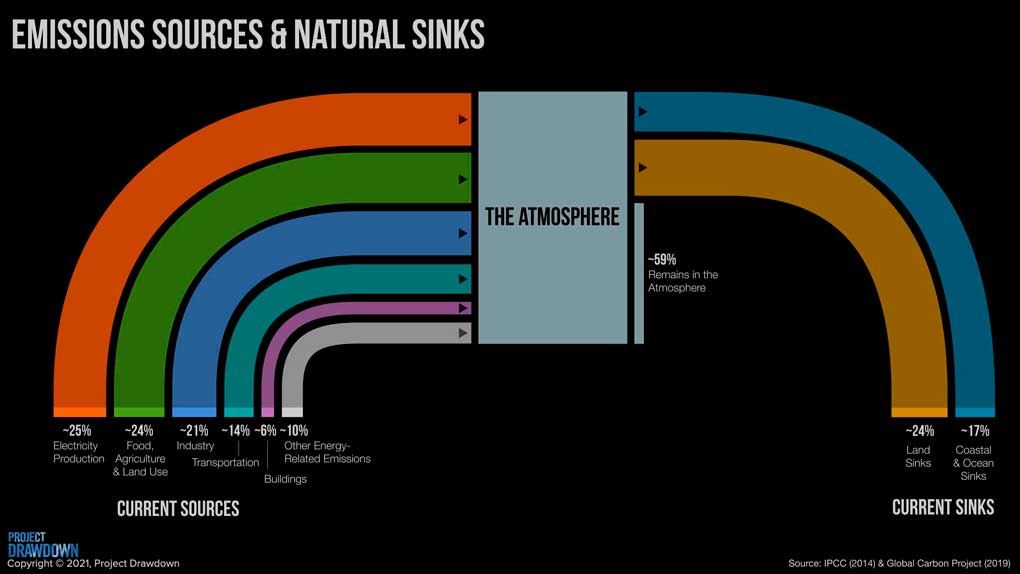
A spiritual look at climate change:
The ultimate test of a moral society is the kind of world that it leaves to its children.” –Dietrich Bonhoeffer
1. Creation is a reflection of the glory of God to be good stewards of God’s creation, which includes all of us who live within it
2. Climate change is a spiritual challenge. Handling climate change is part of how we live our faith.
3. We have a responsibility to care for the least of us. The poorest amongst us bear the greatest burden and risk of climate change.
4. We are called to respond to what we see around us. We are moral messengers for the common good, translate compassion into action.
